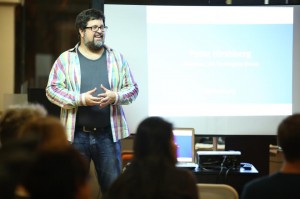Tagspaces is an open variant on the original idea I had for Insytes. While I pitched Insytes as the Web 2,0 replacement for comment systems, it was always much more. Another description I often used was as a personal organizer of knowledge with group capabilities as well as public sharing/publishing. But it also was for building reputation and claiming subject matter expertise that would be validated by a conversational community around topic tags with some conversational agreement by users rather than creators. After all isn’t that why we have found that folksonomy works and taxonomies often fail? .
But even that is not enough. As I was reminded the past 2 days at the IIW2005 – Internet Identity Workshop, you must consider the matter of verifiable Identity – which then must be considered in “context”. What the industry refers to as context (a view of a builder talking about you) I consider it the “situation” because that is where I see people looking out – from their unique situation. Others might want to call it a scenario, or perhaps a use case, though that is too specific I feel, but as some very smart people have said, (Was that Doc Searls?) it does not matter what you call it, just as long as other people understand what you are referencing.
The situation/context of identity for Insytes is what I consider the Open Commons of Knowledge, Information and Wisdom– in this context, people would be opting into the system because they want to be known for who they are. The social and economic capital derived from being ones self is invaluable. Speakers, bloggers, writers, video journalists, vloggers, podcasters, photographers, designers – everyone who creates something for more than just themselves. Of course I know of the exceptions where anonymity is a necessity (whistleblowers, oppressed citizenry etc…) but if someone has a legitimate reason to be playing in the commons and creating stuff, they more often than not want to be identified with the work – or at least a claimed pseudonym as authors have often used in the past.
This is why I still think that Creative Commons needs to be the identity provider – people would be willing to trust them, the license is in wide use and gaining wider adoption and it would make validating a work that much easier for the legal system. Of course, I also think there needs to be Commons Licensing Bureau that manages the sale/licensing of the works to others, but we can talk about that later….
Ok moving past the IIW2005 influences, later today I will be posting the initial draft to serve as a starting point for TagSapces.
(PS – need to adds more links to this article in next rev)
